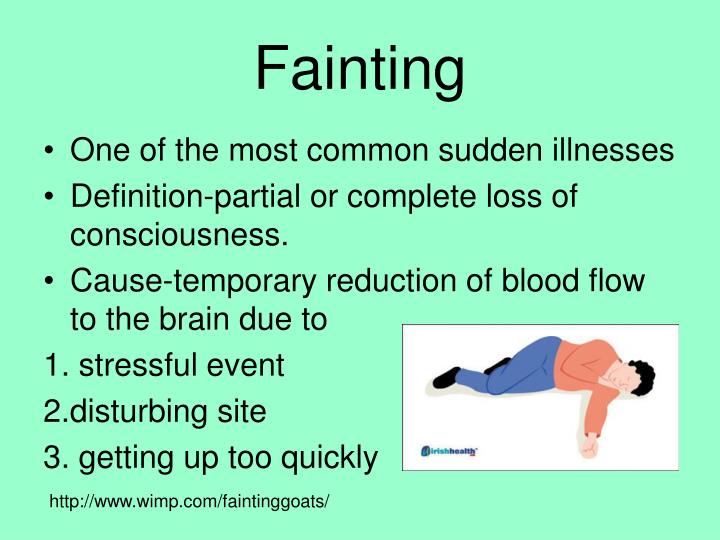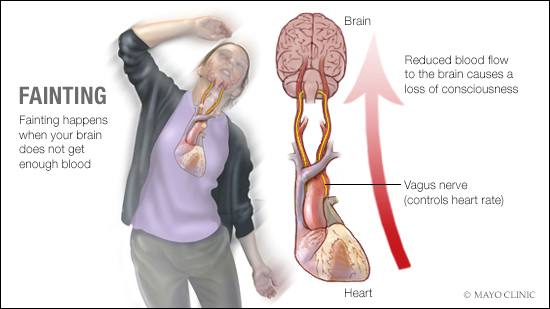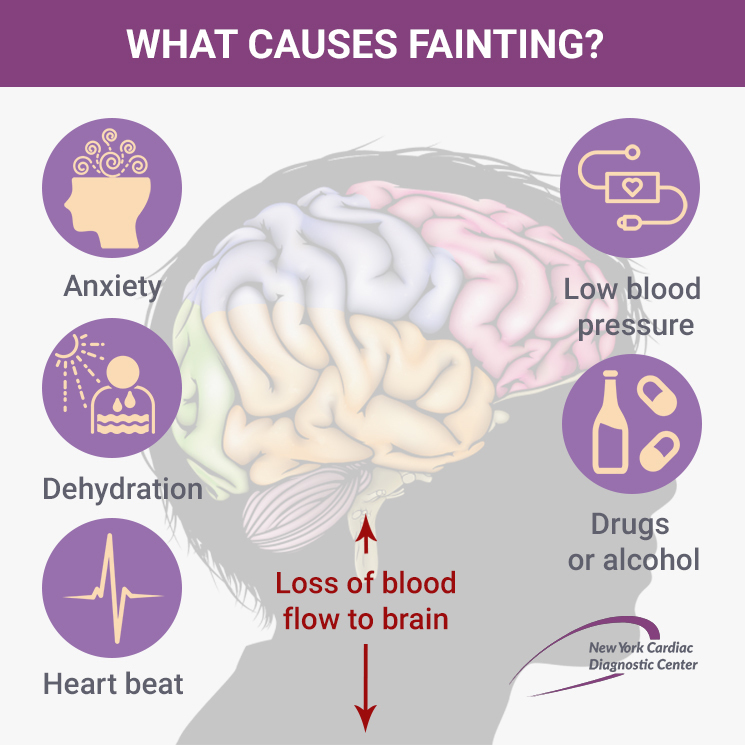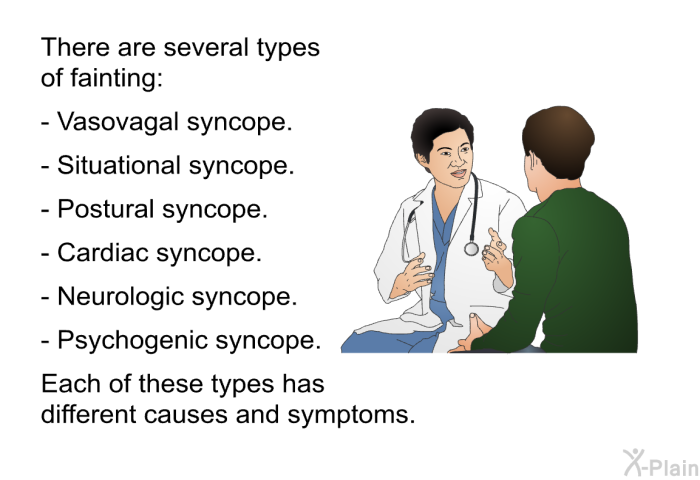The Mystery of Fainting: Exploring the Underlying Causes and Mechanisms
Related Articles: The Mystery of Fainting: Exploring the Underlying Causes and Mechanisms
Introduction
With enthusiasm, let’s navigate through the intriguing topic related to The Mystery of Fainting: Exploring the Underlying Causes and Mechanisms. Let’s weave interesting information and offer fresh perspectives to the readers.
Table of Content
The Mystery of Fainting: Exploring the Underlying Causes and Mechanisms

Fainting, also known as syncope, is a sudden, temporary loss of consciousness caused by a decrease in blood flow to the brain. This seemingly simple phenomenon can have a multitude of underlying causes, making it crucial to understand the intricate mechanisms behind it. This article delves into the various reasons why a person might faint, providing a comprehensive overview of the physiological processes involved and the diverse factors that contribute to this common medical event.
The Brain’s Dependence on Blood Flow:
The human brain is a remarkably energy-intensive organ, consuming approximately 20% of the body’s total energy supply. This constant demand for energy is fueled by a steady flow of oxygen-rich blood, delivered via a complex network of arteries and veins. When blood flow to the brain is disrupted, even momentarily, the brain’s vital functions are compromised, leading to a loss of consciousness.
The Vasovagal Response: A Common Culprit
The most frequent cause of fainting is the vasovagal response, a reflex triggered by various stimuli, including:
- Emotional Stress: Fear, anxiety, or even excitement can initiate a vasovagal response.
- Pain: Intense pain, particularly sudden and unexpected pain, can trigger fainting.
- Blood Drawing: The sight of blood or the experience of a needle prick can induce a vasovagal response in some individuals.
- Prolonged Standing: Standing for extended periods can lead to pooling of blood in the legs, reducing blood flow to the brain.
- Heat Exposure: Excessive heat can cause dilation of blood vessels, decreasing blood pressure and leading to fainting.
The vasovagal response involves a complex interplay of the nervous system and circulatory system. The vagus nerve, a major nerve responsible for regulating heart rate and blood pressure, plays a crucial role. When stimulated, the vagus nerve causes a sudden drop in heart rate and blood pressure, leading to a decrease in blood flow to the brain. This decrease in blood flow triggers the fainting episode.
Beyond the Vasovagal Response: Other Causes of Fainting
While the vasovagal response is the most prevalent cause, fainting can also be a symptom of other medical conditions, including:
- Cardiac Arrhythmias: Irregular heartbeats, such as bradycardia (slow heart rate) or tachycardia (fast heart rate), can disrupt blood flow to the brain.
- Heart Valve Problems: Fainting can occur due to reduced blood flow caused by malfunctioning heart valves.
- Low Blood Sugar (Hypoglycemia): Insufficient glucose in the bloodstream can lead to a decrease in brain function and fainting.
- Anemia: A deficiency in red blood cells, which carry oxygen, can cause fainting due to insufficient oxygen delivery to the brain.
- Dehydration: Fluid loss can lead to decreased blood volume and reduced blood pressure, causing fainting.
- Certain Medications: Some medications, particularly those affecting blood pressure or heart rate, can increase the risk of fainting.
- Neurological Conditions: Fainting can be a symptom of neurological disorders such as epilepsy, stroke, or brain tumors.
The Importance of Seeking Medical Attention
Fainting should not be taken lightly. While many fainting episodes are benign and caused by the vasovagal response, it is crucial to consult a medical professional to rule out any underlying medical conditions. A thorough medical evaluation, including a physical exam, medical history review, and potentially additional tests, can help determine the underlying cause of fainting and guide appropriate treatment.
FAQs about Fainting
Q: What are the symptoms of fainting?
A: Symptoms preceding fainting can vary but often include dizziness, lightheadedness, nausea, sweating, blurred vision, and a feeling of weakness.
Q: What should I do if someone faints?
A: If someone faints, follow these steps:
- Ensure the person’s safety: Move them to a safe location, away from hazards.
- Check for breathing: If the person is not breathing, start CPR.
- Elevate their legs: Raise their legs above their heart to improve blood flow to the brain.
- Loosen tight clothing: Remove anything constricting their breathing.
- Monitor their condition: Stay with the person until they regain consciousness and are fully alert.
- Call emergency services: If the person does not regain consciousness quickly, has difficulty breathing, or has other concerning symptoms, call 911 or your local emergency number.
Q: When should I see a doctor about fainting?
A: Seek medical attention if:
- You experience frequent fainting episodes.
- The fainting is accompanied by chest pain, shortness of breath, or other concerning symptoms.
- You have a family history of heart disease or other medical conditions.
- You are taking medications that can increase the risk of fainting.
- You are concerned about the cause of your fainting.
Tips for Preventing Fainting
- Stay hydrated: Drink plenty of fluids, especially during hot weather or after exercise.
- Avoid prolonged standing: Take breaks and sit down if you need to stand for long periods.
- Manage stress: Practice stress-reducing techniques like yoga, meditation, or deep breathing exercises.
- Avoid triggers: If you know what triggers your fainting, try to avoid those situations.
- Follow your doctor’s recommendations: If you have a medical condition that can cause fainting, follow your doctor’s treatment plan closely.
Conclusion
Fainting, while a common occurrence, can be a sign of underlying medical conditions that require attention. Understanding the diverse causes and mechanisms behind fainting is crucial for prompt diagnosis and appropriate treatment. By recognizing the symptoms, knowing what to do in case of fainting, and seeking medical advice when necessary, individuals can manage this phenomenon effectively and prevent potential complications.


:max_bytes(150000):strip_icc()/1298399-article-img-causes-of-fainting1-5a5520127bb283003773f0c9.png)




:max_bytes(150000):strip_icc()/vasovagal-cardioneurogenic-syncope-1746389-color3-ce8587834a804fb994d99352d0d7329b.jpg)
Closure
Thus, we hope this article has provided valuable insights into The Mystery of Fainting: Exploring the Underlying Causes and Mechanisms. We hope you find this article informative and beneficial. See you in our next article!